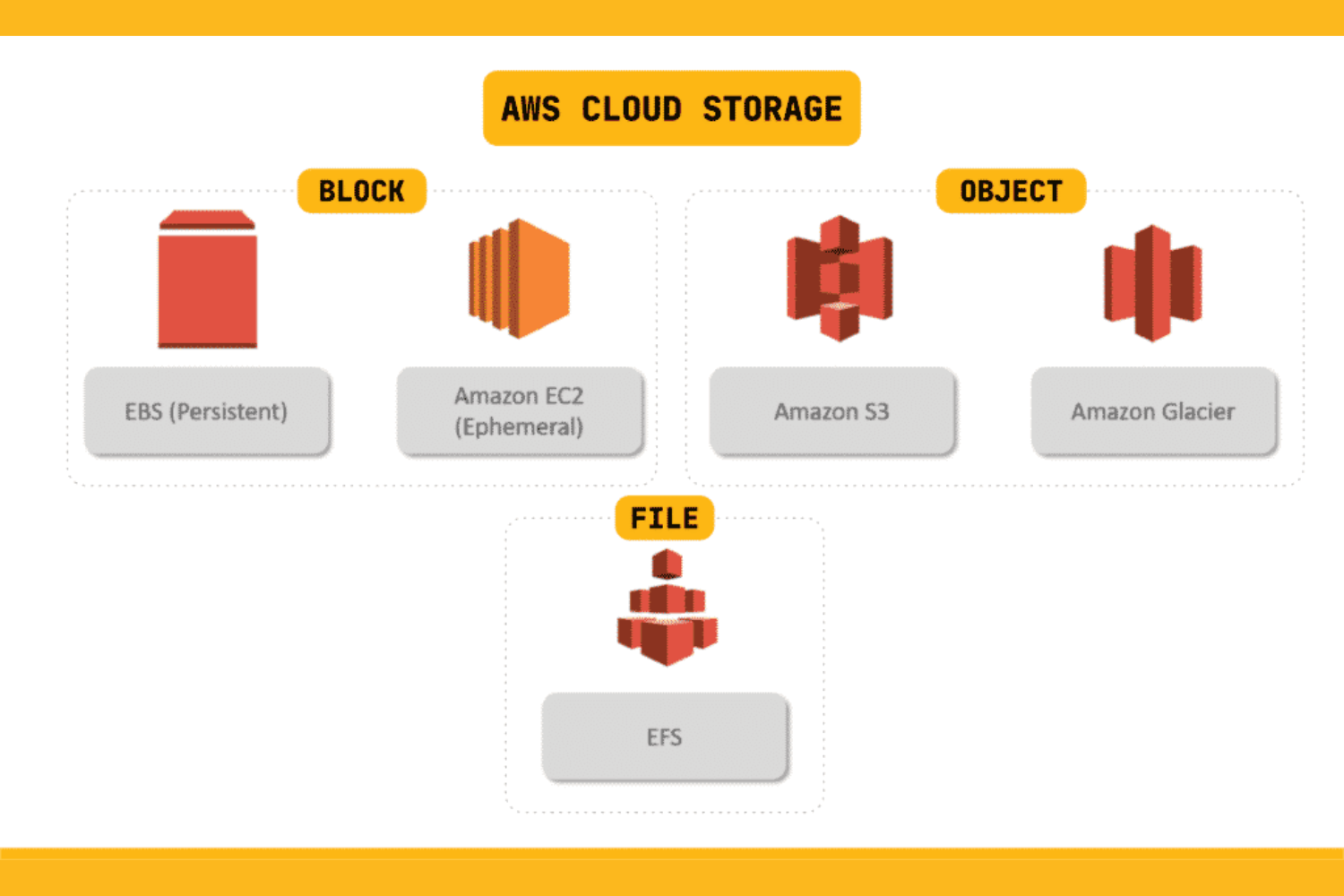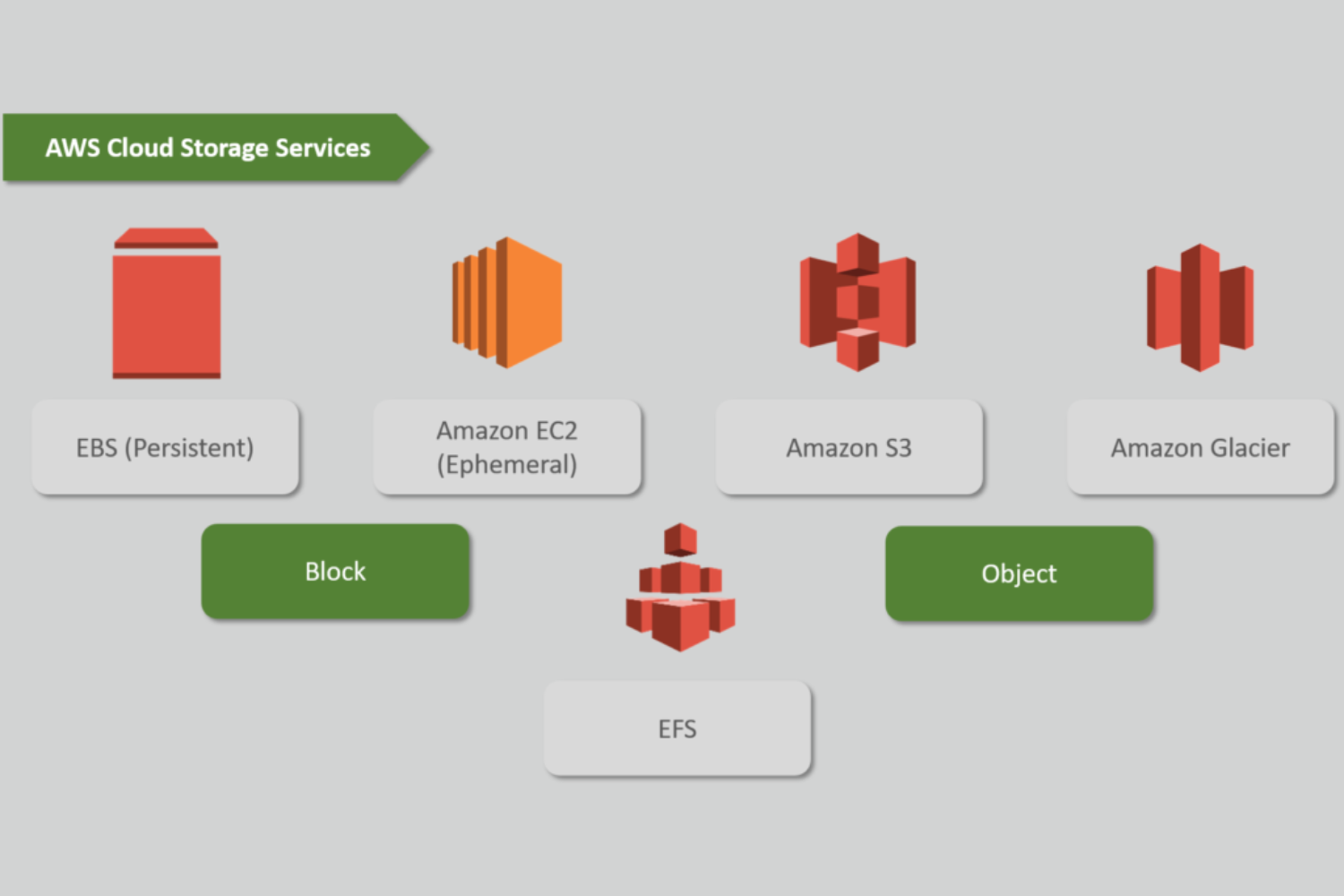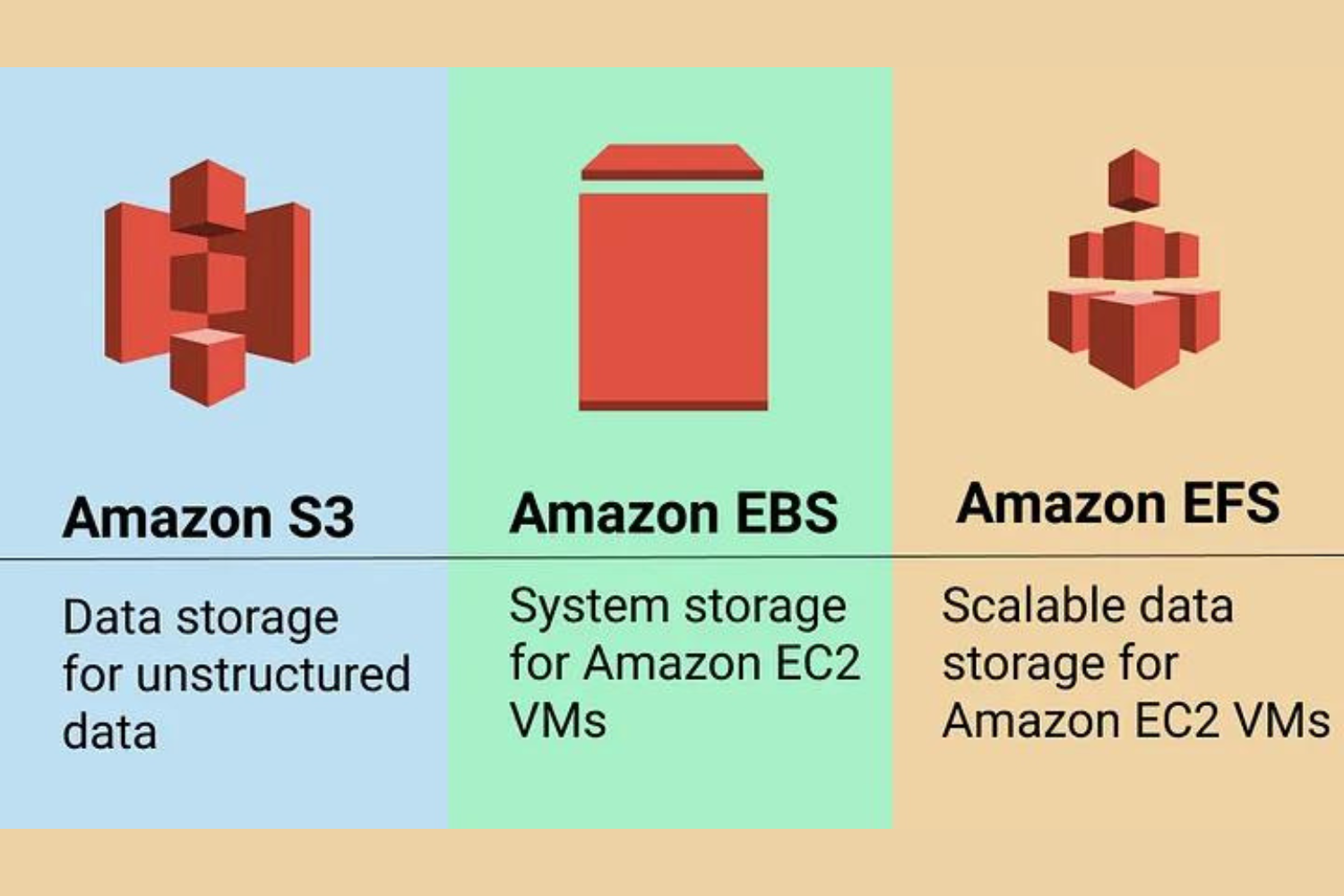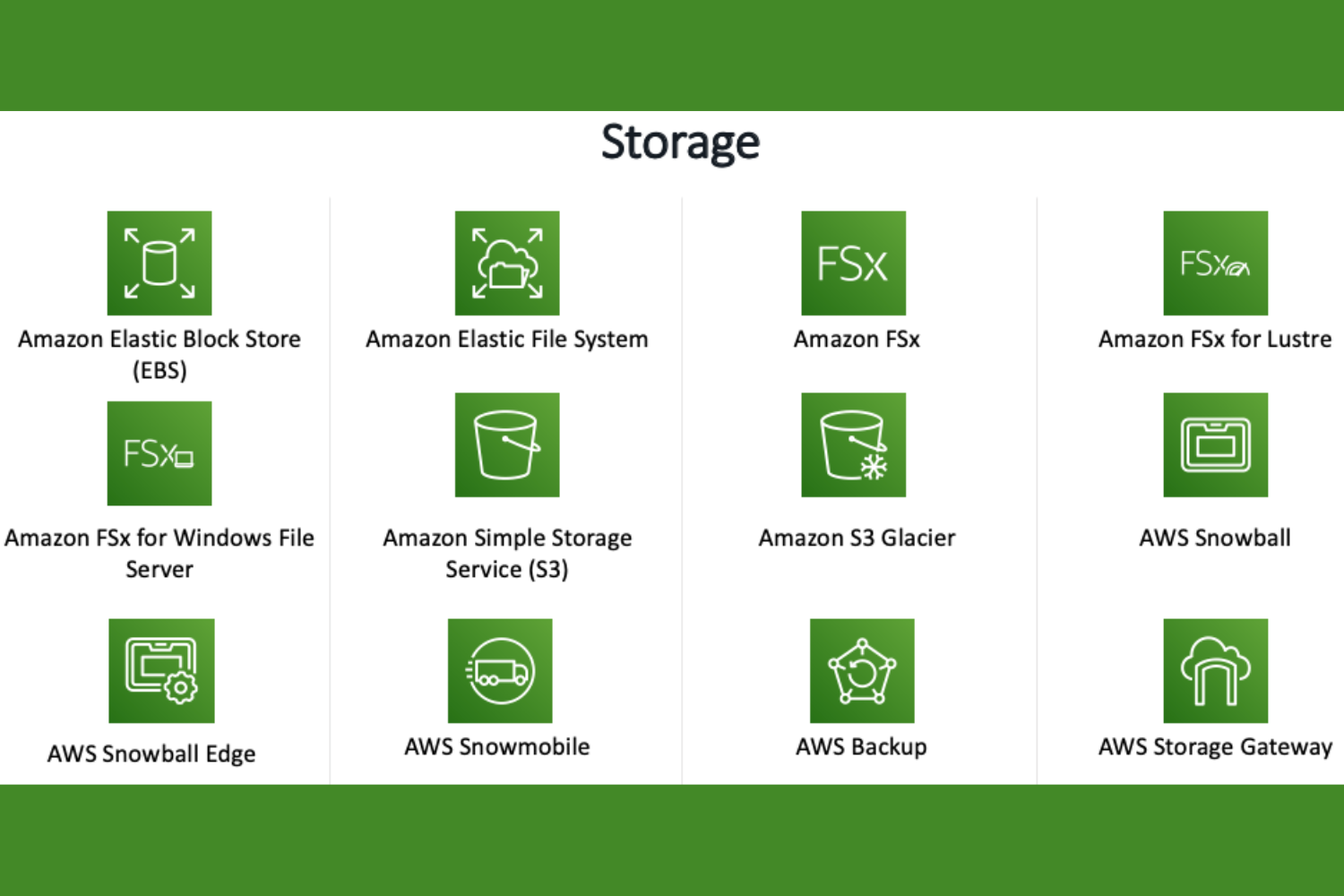
AWS CLOUD COMPUTING STORAGE
AWS cloud storage is a service provided by Amazon Web Services (AWS) that allows individuals and organizations to store and retrieve data from virtual servers maintained by AWS. It offers various storage options such as Amazon S3, Amazon EBS, and Amazon EFS, catering to different needs and preferences.With its scalability, durability, and cost-effectiveness, AWS cloud storage has become a popular choice for businesses of all sizes, enabling them to securely store and access their data anytime and anywhere.

Types of AWS Storage Services:
The three main types of AWS storage services are:
1. Object Storage:
Amazon S3 (Simple Storage Service): This is AWS’s primary object storage service, designed for storing and retrieving a wide variety of unstructured data, such as documents, images, videos, and backups. It provides durability, scalability, and easy access via a web interface or API.

2. Block Storage:
Amazon EBS (Elastic Block Store): Amazon EBS offers block-level storage volumes that can be attached to Amazon EC2 instances. It is suitable for hosting operating systems, databases, and applications that require low-latency, high-performance storage.
3. File Storage:
Amazon EFS (Elastic File System): Amazon EFS provides scalable and fully managed file storage for use with Amazon EC2 instances. It is suitable for applications that require shared file systems and network-attached storage (NAS) capabilities.
These three types of storage services cover a wide range of use cases and are foundational for various AWS workloads.
Why is AWS storage service important:
AWS storage services are essential for several reasons, making them a critical component of cloud computing and modern IT infrastructure. Here are some key reasons why AWS storage services are important:
1. Data Persistence: AWS storage services provide reliable and durable storage solutions for businesses and individuals. They ensure that your data is stored securely and can be accessed whenever needed.
2. Scalability: AWS storage services can scale up or down based on your storage needs. This elasticity allows you to easily accommodate changes in data volume without significant upfront investments or complex infrastructure management.
3. Cost-Efficiency: AWS offers a pay-as-you-go pricing model, meaning you only pay for the storage you actually use. This cost-effective approach eliminates the need for upfront capital expenses and minimizes waste.
4. Redundancy and High Availability: AWS storage services are designed to provide redundancy and high availability. Data is often replicated across multiple locations to ensure data availability and reliability, reducing the risk of data loss due to hardware failures or disasters.
5. Data Security: AWS storage services offer various security features, including encryption, access controls, and compliance certifications. This helps protect your data from unauthorized access and breaches.
6. Data Backup and Recovery: AWS provides tools and services for easy data backup and recovery, which is crucial for disaster recovery and business continuity planning.
Use Case of AWS Storage Services:
The essential storage technologies provided by AWS and their respective use cases.
1. Foundational Storage Technologies:These technologies help you develop apps in addition to being utilized by AWS for running higher-level storage technologies like databases, caches, and other things.
2. Web Server File System:If you want to construct a Web Server with its own file system, you can use AWS EC2 instance storage or Amazon EBS for it.
The main difference is that Amazon EBS is persistent and lets you connect storage across EC2 instances.
3. Application Storage Solutions:AWS provides basic storage technologies along with a range of application storage solutions. These include, among other things, caching, database, and streaming solutions.
4. Caching and Other Storages:AWS provides a number of storage services that function as application middleware. Application data can be cached in memory with AWS ElastiCache (Redis and Memcached) for optimal performance and fast retrieval. One more common use case is the storing of user session data.
How does AWS storage service work?
Here’s a simplified overview of how AWS storage services work:
1. Data Upload: Users or applications upload their data (files, databases, etc.) to AWS storage services. This data can include anything from documents and images to database records.
2. Data Storage: AWS stores this data in its data centers, distributed across multiple locations for redundancy and high availability. The data is organized and managed by the chosen AWS storage service (e.g., Amazon S3, Amazon EBS, Amazon RDS).
3. Data Accessibility: AWS storage services offer various methods to access stored data, such as APIs, web interfaces, and command-line tools. Users can retrieve, update, or delete data as needed.
4. Scalability: AWS storage services can automatically scale to accommodate growing storage needs. You don’t need to worry about provisioning and managing physical storage infrastructure.
5. Data Security: AWS provides security features like encryption, access controls, and identity management to protect your data from unauthorized access and breaches.
6. Data Backup and Recovery: Many AWS storage services offer built-in backup and recovery features, allowing you to create snapshots or backups of your data for disaster recovery purposes.
7. Data Management: AWS storage services often include management features like versioning, lifecycle policies, and monitoring, allowing you to efficiently manage your data.
8. Integration: AWS storage services can be integrated with other AWS services like compute instances, databases, and content delivery networks, enabling you to build applications that use the stored data effectively.
Features of AWS Storage Services:
Here are some of the key AWS storage services and their features:
1. Amazon S3 (Simple Storage Service):
Object Storage: Store and retrieve data in the form of objects, including documents, images, videos, and more.
Durability: Designed for 99.999999999% (11 nines) data durability.
Scalability: Virtually unlimited storage capacity and high request rate.
Data Lifecycle Management: Automate data tiering and archiving.
Versioning: Maintain multiple versions of objects.
Data Encryption: Data can be encrypted at rest and in transit.
Access Control: Fine-grained access control through AWS Identity and Access Management (IAM).
2. Amazon EBS (Elastic Block Store):
Block Storage: Provides block-level storage for use with EC2 instances.
Durability: Designed for 99.999% data durability.
Performance: High-performance options with different volume types (SSD, HDD).
Snapshot and Cloning: Create snapshots of volumes for backups and cloning.
Encryption: Data can be encrypted at rest.
Automated Backups: Automatic snapshots and backups.

3. Amazon Glacier:
Low-Cost Archive: Ideal for long-term data archival and backup.
Durability: Designed for 99.99% data durability.
Retrieval Options: Different retrieval options with varying costs.
Data Lifecycle Policies: Define rules for transitioning data to Glacier.

4. Amazon EFS (Elastic File System):
Network File System (NFS): Provides scalable file storage accessible from multiple EC2 instances.
Elastic Scalability: Automatically scales storage capacity based on need.
Performance: Low-latency access to files and directories.
Data Encryption: Data can be encrypted at rest and in transit.POSIX File System: Supports file locking and strong consistency.
5. Amazon RDS (Relational Database Service):
Managed Database Storage: Provides storage for various relational database engines.
Automated Backups: Automatic and user-initiated database backups.
Read Replicas: Offload read traffic to replicas for improved performance.
Encryption: Data can be encrypted at rest and in transit.
High Availability: Multi-AZ deployments for failover.
6. Amazon DynamoDB:
NoSQL Database Storage: Managed NoSQL database service with high availability.
Scalability: Scales automatically to handle varying workloads.
Data Encryption: Data can be encrypted at rest and in transit.
Global Tables: Synchronize data across multiple AWS regions.
7. AWS Storage Gateway:
Hybrid Cloud Storage: Integrates on-premises environments with AWS cloud storage.
File, Volume, and Tape Gateways: Support for various storage protocols.
Data Transfer: Efficient data transfer between on-premises and cloud.

8. Amazon FSx:
Managed File Storage: Fully managed Windows and Lustre file systems.
High Performance: Designed for high I/O performance and low latency.
Integration with AWS Services: Seamless integration with EC2 and other AWS services.
9. Amazon EKS (Elastic Kubernetes Service) Volumes:
Provides storage options for Kubernetes pods in AWS.
Course Highlights/ Details:
1. Suited for students, fresher’s, professionals, and corporate employees
2. Live online classes
3. 4-month program
4. Certificate of completion
5.Decision Oriented Program of Analysis
6. Live Classes by highly experienced faculties
7. Hands-on experience with real-life case studies.

Conclusion:
AWS provides you with multiple storage options right from legacy backup to modern high throughput, distributed file systems. Based on your requirements, you can go with one or more storage services. AWS provides you with high availability and high durability so that you can always be assured that your data is safe, secure and readily available for all your use cases.







